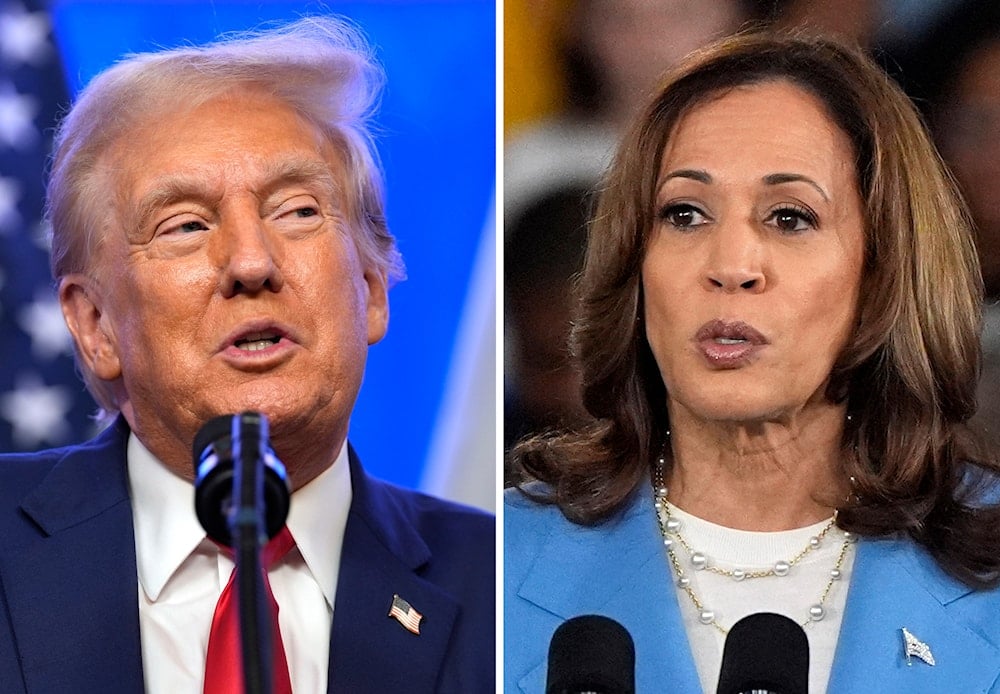Survey insights reveal 2024 US Presidential race dynamics
Recent insights reveal how religious affiliations, financial backing, and foreign policy concerns are driving the 2024 presidential race.
-

This combination photo shows Republican presidential nominee former President Donald Trump at an event, August 15, 2024, in Bedminster, N.J., left, and Democratic presidential nominee Vice President Kamala Harris at a campaign event in Raleigh, N.C., August 16, 2024. (AP)
As the 2024 presidential election approaches, new surveys and financial data offer a revealing snapshot of the current political landscape, highlighting significant divides in voter support and campaign funding.
Religious support shows clear divide
A recent survey by the Pew Research Center, conducted from August 26 to September 2, 2024, indicates notable differences in voter preferences across various religious groups;
Former President Donald Trump enjoys strong backing among white religious voters:
- 82% of white evangelical Protestants support Trump
- 61% of white Catholics favor him
- 58% of white non-evangelical Protestants lean toward Trump
Vice President Kamala Harris finds substantial support from other religious groups:
- 86% of Black Protestants are backing Harris
- 85% of atheists are aligned with her candidacy
- 65% of Hispanic Catholics and 65% of Jewish voters also support Harris
These figures highlight a pronounced divide in voter support based on religious affiliation.
Financial contributions show Trump is in the lead
In terms of campaign funding, the financial backing of the candidates reveals a distinct disparity. Data from the Federal Election Commission, supplemented by Bloomberg Billionaires Index information, shows that Donald Trump has secured significant contributions from wealthy individuals. Thirteen billionaires have donated at least $24.4 million to his campaign.
Key donors include Miriam Adelson, Diane Hendricks, and Kelsey Warren, each of whom has contributed the maximum allowable amount to Trump's committee and an additional $5 million to a supporting political action committee.
On the other hand, Kamala Harris has received substantial support from 20 wealthy donors, who have contributed a minimum of $12.8 million. The largest donor to Harris is former Google CEO Eric Schmidt, who has donated nearly $3 million to her campaign.
This financial advantage for Trump underscores the significant influence of billionaire donors in the 2024 race.
Foreign Policy concerns influence voter sentiment
A survey conducted by the Cato Institute, involving 1,500 respondents from key swing states—Pennsylvania, Wisconsin, and Michigan—highlights growing concerns about US foreign policy.
According to the survey, a majority in each state feels that the US is "overly involved" in global conflicts and affairs (Wisconsin: 53%, Pennsylvania: 50%, Michigan: 52%). Moreover, most respondents believe US foreign policy does not prioritize American interests (Wisconsin: 62%, Pennsylvania: 61%, Michigan: 60%).
There is significant apprehension about the possibility of World War III, with substantial portions expressing this concern (Wisconsin: 59%, Pennsylvania: 51%, Michigan: 54%).
The survey also reveals a close race between Harris and Trump in these crucial swing states:
- Harris leads Trump in Wisconsin (51% vs. 46%)
- Trump has a slight edge in Michigan (48% vs. 47%)
- The candidates are statistically tied in Pennsylvania, each garnering 47% among likely voters
These insights provide a view of the current electoral dynamics and underscore the impact of religious affiliations, financial contributions, and foreign policy concerns on the 2024 presidential race.

 3 Min Read
3 Min Read








